Chris Jc
Will read the whole novel soon, but after checking more than 1 movie adaptation of les miserables, I dare say 1978 succeeded to draw the characters in the way meant by the director and created an aura of heroism, integrity and sweetness around the main character (Jean Valjean). On the other hand, this movie demonized Javert as a contrary to the goodness of Valjean, but it wasn't just that, he was pictured as someone who was destroyed from inside and deeply wounded from his past and how he was born and lived as a child; although he haunted Valjean's life all along the movie, he was shocked by how good and chivalrous Valjean was when he could have killed him but decided to set him free instead, he probably felt too small and trivial in front of Valjean's strength. The scene of Valjean carrying Marius fainting on his shoulder after fighting against the troops is just amazing, a man as old as Valjean at this point of the plot carrying a young man on his shoulder all along a ditch to keep him safe, a memorable scene!
Neil Welch
I'm not an expert - I haven't read the book and don't expect to - but I have seen several of the filmed versions, and this is by far my least favourite. Having said that, I loved Antony Perkins' Javert: his tightly buttoned implacability was perfect. And I liked Caroline Langrishe's rather underwritten Cosette.But there was a lot I didn't like very much. The whole thing seemed terribly bright, colourful and clean and maybe, in those days, your life actually was bright colourful and clean - if you had money, that is. But the whole point of Hugo's writing was social commentary, and I didn't see very much of the disadvantaged underclass in this movie. I also didn't like Valjean meandering off at the end.But most of all, I didn't like Valjean. I'm not a Richard Jordan fan at the best of times - I always got the feeling that he thought he was rather better than I thought he was. Notwithstanding his increasingly grey (but no less unconvincing) wigs and sticky-on beards as he got older, he was far too lightweight an actor to play a character like Valjean.I was delighted and surprised to spot my late friend Michael Sheard in a small role.
ParanoiaPoliticianDiva77
This is a very good adaption of Les Miserables, but only as a stand alone. I have both read the novel and am a great fan of the Schonberg stage musical. And while watching this I could not help but search for the missing Thenardiers, who appear for one measly minute, the tragic Eponine, the evil and yet wonderful Patron-Minette, the story of Monsieur Tholomyes and Fantine. All of this was left out and though this was fabulous by itself, I could not help but notice the absence. However, Perkins' Javert was truly amazing; he embodied the character and his principles perfectly, the way you could sense his feeling of duty but the scrupulous way he watched Valjean/Madeline and noted the similarities between prisoner and mayor. You could sense his utter confusion after running off in the sewers, and you knew what he was thinking though he did not say another word, throwing himself into the Seine. You understood his character perfectly without him having to necessarily voice his thoughts; his ideal that he was put on earth to serve the law was characterised perfectly. Valjean was portrayed well by Richard Jordan, but the character simply wasn't likable, you sympathised with him in prison, you smiled at his triumphs as Mayor, you understood the various predicaments he faces, but you couldn't bring yourself to like him. The character of Fantine, originally a character of pure tragedy, a symbol of the les Miserables, was reduced significantly. You knew nothing of her past life, her former beauty, her former purity, all you knew was the basics about her and Cosette. This simply was not enough. Marius and Cosette were quite true to the book, their meeting different but with the same meaning behind it. Marius was not explained enough, probably why I liked him (the Original Novel Marius needs to be killed with spoons) and Cosette was sweet enough. The merely was too much of Valjean and Javert (there was more detail of their past than Hugo included-that is truly saying something) and not enough of the rest of Hugo's masterpiece. As a stand alone? 9/10. But in comparison to the original novel? 5/10. So I'll go 50/50 and give it a 7 cause I'm nice.
hannah, holla! (obsetress)
This was the truest adaption from the book to screen that I have seen, but the character of Eponine is missing. (You do see a very short clip of Eponine as a young girl, but that is not when she has a crucial part to play in this story.) Yes, it is managed fine without her, but her character adds more drama to the movie, and makes the movie better. While the movie was true to the book, I found it quite like a fan fiction that is true to the book itself. There were several mis-pronunciations, Marius was once called "Mario," Cosette wore a dress almost identical to a dress that Young Eponine wore at the beginning of the movie, and some of the filming techniques were quite odd. (For example, Javert appearing to do a flip while he falls into the Seine.) I also felt that it was unnecessary to spend so much time while Valjean is at Toulon. If you are interested in seeing a Les Mis movie, I would not recommend this; I would recommend first the 1935, and then the 1998.


